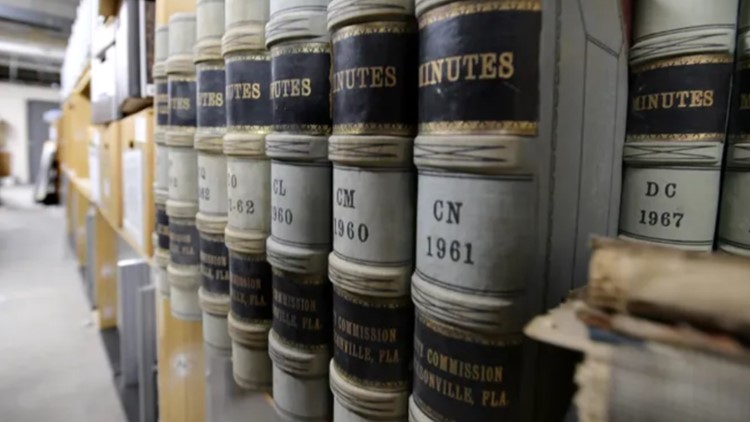JACKSONVILLE, Fla. — The journey into Jacksonville's past starts with an elevator ride to the basement of City Hall (yes, it has a basement) and down a corridor to a windowless room where hundreds of bound volumes sit in wall-to-wall bookcases that require turning sideways to walk between them.
The records date back some 150 years and tell a story of Jacksonville that mixes high drama with everyday tidbits of what it was like to live and work in the city over that time.
There's the volume that has the minutes of City Council's first meetings after the devastating Great Fire of 1901 when city leaders were scrambling to recover. The hand-written, flowing cursive writing for those minutes is historic in its own way — a throwback to an era of penmanship long before computer keyboards.
There's the minutes from 1965 when City Council granted a request to use a city vehicle so the superintendent of the prison agricultural department could attend a "one-day Swine Production meeting" hosted by the Florida Prison System. "My two Swine herdsman will attend this meeting with me," the minutes record the superintendent reporting.
Page after page, the books offer a grand tapestry of the first draft of Jacksonville's history.
When City Council Secretary Peggy Sidman took council President Ron Salem on a tour of the room while pitching to him the idea of preserving the records for future generations, she called his attention to the pipes attached to the ceiling. He took the warning to heart.


"These records are one pipe bursting from being ruined, and that would just be a tragedy for the history of this city," Salem told City Council members during a Rules Committee meeting last week.
On Tuesday, City Council unanimously approved an arrangement for the Jacksonville Public Library System to move the books from the basement to the special collections room on the fourth floor of the main library downtown where they'll be preserved for future researchers. The library system also will digitize the records so anyone with access to a computer anywhere will be able to search through the cross-reference records.
Library Director Tim Rogers said that when Jacksonville celebrated its bicentennial in 2022, "there were very few documents that were available to describe what happened and how it happened."
"When we get to the 300th anniversary or the 400th anniversary, we don't want that to be the case," Rogers said.
Salem agreed to chip in $122,500 from a spending account he controls as council president. City Council unanimously approved that expenditure. The library system will assign staff to do the digitization work in-house over the next 18 months.
The funding is the second time this year the library system has received support for digitizing the city's history. The Mellon Foundation awarded a $1 million grant in January that will expand the library's Memory Lab services and its African American History Collection by, among other initiatives, digitizing records such as newspapers, yearbooks, annual reports, church directories and similar historic documents.
In the case of the city records stored now in the basement, the volumes contain meeting minutes, ordinances, resolutions, and ledgers dating back to 1870 for the city and the towns of LaVilla and Murray Hill before they became part of Jacksonville. Sidman said the first time she entered the basement room, she was struck by how irreplaceable the documents are.
"I was in awe of it because I'm a history major," she said. "I was just like 'wow' and then quite frankly the weight of the potential of losing them."
Moving the collection to a climate-controlled room in the main library will help protect the paper-and-ink records. For the searchable digitized records, those files will be stored on computer servers maintained by the city and another site.
Sidman has been in talks with the University of Florida system about it also being a keeper of the digitized records, which would make them available to researchers at colleges and universities across the state. Having the digital files in two locations will guard against losing them to a computer hack.
While those records will be accessible by Internet search, the actual documents also have value to researchers.
"Some people want to know what the text was, some people want to see an image of the text, but some researchers will want to see the document and touch the document in some way," Rogers said. "So, we want to make sure we have all aspects of that covered."
He said the library system plans to use the documents as the start of what it's calling the City Archive Project that will be expanded as time goes on.



